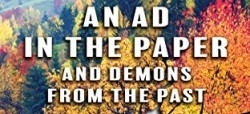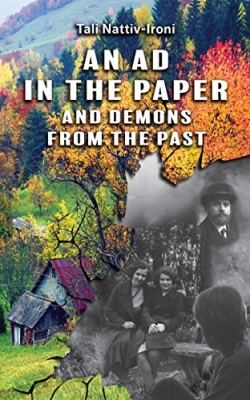Documenting Survivors and Keeping Sane
May 1933 was a beautiful spring month in that small town in Czechoslovakia, with the lilac flower aroma in the air.
A shaliach from Eretz Israel, then British Palestine, who was sent to Europe to try and get Jews out before it's too late, arrived at the small town. He gathered the Jews in the local synagogue and told them that "not far from here, in Germany, a certain man was elected to the parliament. His name is Adolf Hitler, and he is dangerous to the Jews."
His words fell on deaf ears.
Only one young woman went home thinking of what she had just heard, and after a long argument into the night with her husband she packed a few things, her Singer sewing machine, dressed her 13-year-old daughter with her best clothes and boarded a train to the nearest port city.
A few days later they arrived in Eretz Israel, thus saving the family tree from being chopped forever. All the Jews of that town were soon to be sent to death camps.
That brave woman was my grandmother. Her only daughter was my mother. I wouldn't have been here if it wasn't for her courageous act. I was always too embarrassed to ask what made her make that move.
My father came as a pioneer in 1929 with a group of halutzim. Ten years later, in 1939, only weeks before Germany invaded Poland, he rushed back to Poland to try and save the rest of his family and rescue them before it was too late. He managed to get his parents out, but his brother and sister refused to believe that anything was going to happen, and this was a short time before the war broke out. Denial was the best defense mechanism.
Not much of that was told to me as I grew up. Occasionally my father would say how much he missed his older brother, his role model, and my mother would show me her father's photo, a handsome man with a black beard. Before she died, she gave me a big envelope with many letters in Yiddish her father wrote to her, begging her to come back home. I used them as a base for my documentary Letters from my Grandfather I never knew.
When I was in 6th grade in an elementary school in Tel Aviv, Ben Gurion, then the prime minister of Israel, announced that there is going to be a huge memorial institution, named Yad Vashem, in which all six million names of Jews perished in the Holocaust will be engraved on stones and commemorated.
Special designated forms were sent to all the schools around the young country to be given to the children to take home and be filled by their parents. I remember vividly that when the teacher came closer to me and handed me the form, I shook my head and told her that our family was not connected to the Holocaust in any way. I didn't want to be connected to the disaster that destroyed a third of our people. She insisted, I took the form home, and the next morning I returned it with dozens of names written by both my parents. Who are all these people, I asked myself. How come I have never heard of them? So many of them gone. Entire families. How is that possible?
I grew up, not knowing much, other than what we learned in school, which was hard to perceive for a child. The mega tragedy was something we could not process. Six million was a huge number that didn't mean much. It was conceived as a national tragedy, like the destruction of the temple, something in the macro terminology, not personal. Not as something that happened to people with names and identities, to children, to babies.
Then, already in high school, we all listened to the Eichmann trial on the radio. At home, in school. Still, too huge to comprehend. I remember crying only when the announcer said that a testimony was stopped because the witness had fainted and collapsed to the floor of the courtroom. It was the famous author K. Tzetnik (Di-Nur).
But for the young country old wounds had opened. There was no way back.
I was well into my 40s, a journalist and a book translator and editor, a mother of two, living in Raanana, when a small ad in the paper had caught my eye.
The ad asked for volunteers to document survivors. I immediately picked up the phone and called the number listed in the ad. What urged me to do it is a mystery to me until this very day. I don't think I ever met a survivor until then but something strong inside me told me I had to make that call.
Ever since then I divide my life to "before" and "after". I took part in the Steven Spielberg project, better known as Survivors of the Shoah Visual History Foundation, established in 1994. My novel, a romance thriller, An Ad in the Paper and Demons From the past, is based on my experience from those days. From being a person who didn't show much interest in the subject, who didn't ask, who didn't want to know, I became obsessed.
For 10 days I would show up every morning at Beit Hatfutzot (today known as Anu, The Jewish Museum) in Tel Aviv, for longs days of lectures, workshops, discussions, and training for the sacred task of documenting Holocaust survivors. Those of us, the lucky ones, picked after interviews for the week seminary, listened to historians, psychologists, social workers, survivors. They all had one thing in common – the Holocaust.
That week was so intense and opened a new world for me, that I remember thinking that even if I don't pass the final exam, which was being watched by Spielberg's people interviewing a survivor, this was the most interesting and enriching week of my life.
I was accepted. Interviewing many survivors was the most important mission of my life. Why Spielberg didn't get the Nobel Prize is beyond me.
In every country around the world where Jews live, 35 countries, Spielberg people, 3,000 of them, were there to document the horrors. And I had the honor to be one of them.
After many years of silence and denial they wanted to talk, to tell. They finally allowed themselves to grieve out loud. Before that, they were busy rebuilding their lives, raising families, integrating with the Israeli society. Before that, nobody was ready to listen, to hear.
Maybe it was at that time that their children and grandchildren began to ask questions. Maybe it was easier to talk to the third generation. There was no need to protect them. The Israeli society became more open. Also, the survivors felt resentment and anger towards the Holocaust deniers and didn't want to take their stories with them to their grave.
I became obsessed. We were not allowed to do more than two interviews a week. Every week I would argue with Spielberg's headquarters people in Jerusalem, saying that two a week is not enough, that many of them die every month, taking their untold stories with them. Sometimes I managed to "cheat" and do more. Once, I drove up north with the video cameraman to Kibbutz Kfar Hanassi for a long weekend, to do a marathon of interviews with many of the survivors that founded the kibbutz and live there. On the way there, I gave a ride to a soldier heading north to his base near the Lebanese border. I told him where we were going and what we are going to do there and he asked: "Aren't you afraid to 'lose it', listening to so many tragic stories in one weekend? What a heavy burden you are taking on yourself."
Their burden is much heavier, I thought.
Until that point it never occurred to me that I might have gotten carried away. This is when I started writing a diary about my feelings and thoughts, a diary that became my second novel, based on my experience in the Spielberg project. I changed the plot a little, but all the stories there are true. They all happened to people. I remember them all.
Research showed that those who told their stories felt a relief. A sense of delivering on that horrible part of the Jewish history to the next generations. Some talked about a beginning of a healing process. But it was not easy for them to be taken back to the world of their traumatic "there" and "then." They relived the horrors in front of the camera. I often had to hide my tears or they would feel sorry for making me sad.
In my book there are some fiction elements but a large piece of my life story. I took the liberty to blur the boundary between history and literature. The story is not just mine. It's the story of the survivors and the second generation, that paid a huge price too.
Did I or didn't I have a love affair with my cameraman? That's for me to know and for you to find out.
I placed the plot in Tel Aviv in the 1990s during the Gulf war. The thought of survivors sitting in sealed rooms like ducks at a shooting range wearing gas masks and listening to the sirens broke my heart and wouldn't leave me for years after the war.
My unconscious choice to be part of the Spielberg Project was, like Ilana's, the main character, like a shot in the dark. Ilana is me, but also not me. She, like me, is the product of the Holocaust, the wars here, the daily terror, the desire to live a normal life in an abnormal impossible situation. I, like her, think that we all are second generation and third, and forth, until the end of time.
Victor Frankel talked about giving meaning to his life in the death camp. That project made my life here meaningful.
These days I am writing a comedy. A funny play. Israel is also fun, you know, and I like to make people laugh.
An Ad in the Paper and Demons from the Past by Tali Ironi is available on Amazon.









Comments